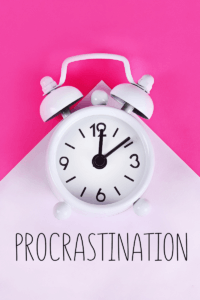This post may contain affiliate links, which means we may receive a commission, at no extra cost to you, if you make a purchase through a link. Please see our full disclosure on the Affiliate Disclosure Page.
If procrastination was an Olympic sport, I’d have several gold medals already.
Maybe.
Except, I’d probably have put off getting my passport to travel to the Olympics. Then I wouldn’t be able to compete.
That sounds about right.
Sound familiar? Do you put off things you know you need to do, but don’t want to do?

What is Procrastination?
Procrastination is the habit of putting off tasks we know we must complete. These tasks can be related to school, work, family, church, or anything else that we do. Usually, we procrastinate because the tasks we need to complete are dull or unpleasant. Unfortunately, if we put off these tasks for too long, it can cause damage to our performance ability and reputation. More often than we’d like to admit, it causes us unnecessary anxiety.
How do we Procrastinate?
Many people think that those of us who procrastinate are lazy. The opposite it true. Procrastination is an active process. We know what needs to be done, but we actively choose to do something else. We may do other tasks–which may or may not be related to the ones we need to get completed. We may read, watch TV, scroll social media, draw, watch videos on YouTube, make plans to do the work, or do 1001 other things to avoid doing what we really need to be doing.
Why do we Procrastinate?
Since we just learned (we already knew it, but others may not have known it) procrastination is not laziness, so why do we do it?
There are many reasons why people (like us) procrastinate:
- Lack of self-control (want to do something else and do it)
- Fear of failure
- Multitasking (doing too much at one time)
- Feeling like it’s not urgent (no looming deadline)
- Perfectionism
- Built up bad habits
- Negative self-talk (telling ourselves we can’t do it or can’t do it well)
- Fear of overwhelming and complex projects
How Can We Stop Procrastination?
That’s a very broad question.
Not everyone wants to stop procrastinating.
When I was in college, I would literally wait until I didn’t have any more “in a minute” times left to get my work done.
I hold 3 college degrees–a Bachelor’s and 2 Masters. At no point in my studies did procrastinating affect my grades. Once I found the major I really liked for my Bachelor, I had a 4.0 GPA in those classes. I had a 4.0 GPA for my first Master’s degree, but I only had a 3.96 GPA for my second. (I missed my 4.0 by 1 point in 1 class. YES, I tried to argue with the professor that I deserved that 1 point to take my grade from an 89 to a 90 so I could have a 4.0 GPA. No luck.)
With that track record of success in my classes, I saw no need to change my methods. I was doing well.
I didn’t want to stop procrastinating. I saw no reason for it.
Now, however, I’m working to build a blog, a community on social media (follow on Instagram and Pinterest), a YouTube channel (watch here), an Etsy business (shop here), and write a book.
I have no time to procrastinate anymore. Unfortunately, I still do. I actually put off writing this blog post for far too long.
Now that I am writing it, it feels great. I’m putting words on the page, and I know that somewhere out there YOU are reading this because YOU need the same tips I need to stop procrastinating.
Are you ready? Do you want some tips?
Tips to Stop Procrastinating
Connect Work to Goals
Be sure you know the big picture of what needs to get done. Each task in the goal can be divided so you can see progress.
Clarify Priorities
Have deadlines. Know what is needed now and what can wait until tomorrow. (Yes, I really do mean tomorrow.) Every day, you should know who is depending on you to get something completed.
Use Goals to Fight “Perfectionism”
I have ADHD. That is one of the reasons why I procrastinate so well. The slightest shimmer of something more exciting grabs my attention.
I am also a perfectionist. I live by the motto: “If you want it done right, do it yourself.” Unfortunately, that leaves me with far too many things on my to-do list every day.
In order to fight the perfectionism that arises as I work on a task, I have to determine the impact of the task. Who is depending on me? What happens to me/them if I don’t complete this today? In the big picture, how will this waiting another day affect everyone else? When I think about how the task I have to do affects others, I tend to be able to finish things more quickly without putting them off.
Another way to get around perfectionism is to define what “finished” is before you start. What does it mean that this task is finished/completed? Will there still be things that I need to do? Maybe, but I can’t keep working on this one thing.
For example, if you have to clean the bathroom at your house, decide what it means to be done. Do you need to deep clean the grout in the tile today, or can the floor survive with sweeping and mopping? Is today the day to soak the shower heads to get the stuff off of them, or can you just wash them with soap and water this time? Know what it means for the task to be complete before you start. That way you can’t tell yourself, “I need to do ________ before I stop.”
Nope.
You completed it the way you said it would be done. Check it off. Move on.
Break Tasks Up
If the task ahead of you, that you keep procrastinating, is large, break it up. Turn it into 8 different, smaller tasks that you can complete in less time.
Write a To-Do List
For every task that is on your list, be sure to write out all the steps.
That may sound crazy. I know it probably does.
However, if we look at the bathroom example, we can see how this would help.
- Clean the bathroom
- Shower
- Toilet
- Sink
- Countertop
- Mirror
- Door handles
- Sweep floor
- Mop floor
- Etc
Looking at that list, it takes up a lot of room, but if you check it off as you go, you can see the big task getting completed.
This works with school assignments, work projects, and personal things, like business tasks. Take the time to write down all the big things you need to get accomplished. Then, go back to the list and write out a list of smaller tasks that make up the big tasks.
Sometimes, you won’t complete the big tasks in one day. You may have to clean the toilet today and move on to do a small task on another list.
Does that make sense?
One big task may take a few days, but you will be able to see that the smaller tasks under it are being completed as you go.
Set Deadlines
Depending on the task, these deadlines may come from you or someone else. However, be sure that you know the deadline, put it on your calendar, and work on the tasks in time to get them completed.
If it is a large task, break it down and set deadlines for each of the parts of the task.
Reduce the Number of Decisions Needed
When I read this, I wasn’t sure I was going to like it. I thought this tip was going to tell me to have someone else make decisions for me. That will NOT work for me.
However, there are ways to reduce the number of decisions you have to make every day.
For example, create habits. Here’s an easy one for you. Do you ask yourself in the morning if you are going to brush your teeth? Probably not. You brush them because it’s part of your morning routine; it’s a habit.
You can do the same thing with other decisions, like eating breakfast and going to the gym.
Another way to reduce decisions in a day is to include the next day’s decisions in your nighttime routine.
Make your to-do list but put the 3 things that must get done the next day at the top.
Put time for these tasks in your schedule (paper or digital) for the following day.
Pick out your clothes for the next day.
When this becomes a habit, you will be able to do this without having to make too many extra decisions as well.
Adjust Your Environment
Some people thrive working in busy offices. Other people do well at coffee shops with noise and traffic. I can work in either of those places, as long as I can block out the distractions.
However, for me, it’s better not to have distractions at all. In my house, I have an extra bedroom I have claimed as my office. I have bookshelves, 3 desks (for different tasks–that’s a different story), and everything I need to complete my work every day.
Decide what you need to complete your tasks. Do you need to feel like you are part of the hustle and bustle, even if you aren’t interacting? Would a quiet corner in a home office better suit you?
Bonus Tips to Stop Procrastination
Here are a couple of ideas for time management in order to help beat procrastination.
Timers–Set a timer for 30-60 minutes. When the timer goes off, set it for 5 minutes for a break. Repeat this until you have completed the task.
Time Blocking–Set specific times each time for specific tasks. If you are better in the mornings, do your hardest tasks at that time. If you are stronger in the evenings, complete the complex tasks then.
2 Minute Rule–If a task can be completed in 2 minutes or less, do it NOW! Do not wait!
I Beat Procrastination!
After several weeks of putting off this post, I finally researched (which I love doing) and wrote it (also something I love) in two days. When I say two days, I mean it took about 3 hours in total.
You Can Do It Too!
Use some of (or all of) these tips and tricks to stop procrastination. Try them for yourself, your spouse, and your children. Incorporate them into your life.
Leave a comment if you have other tips you have used successfully to stop procrastinating!



